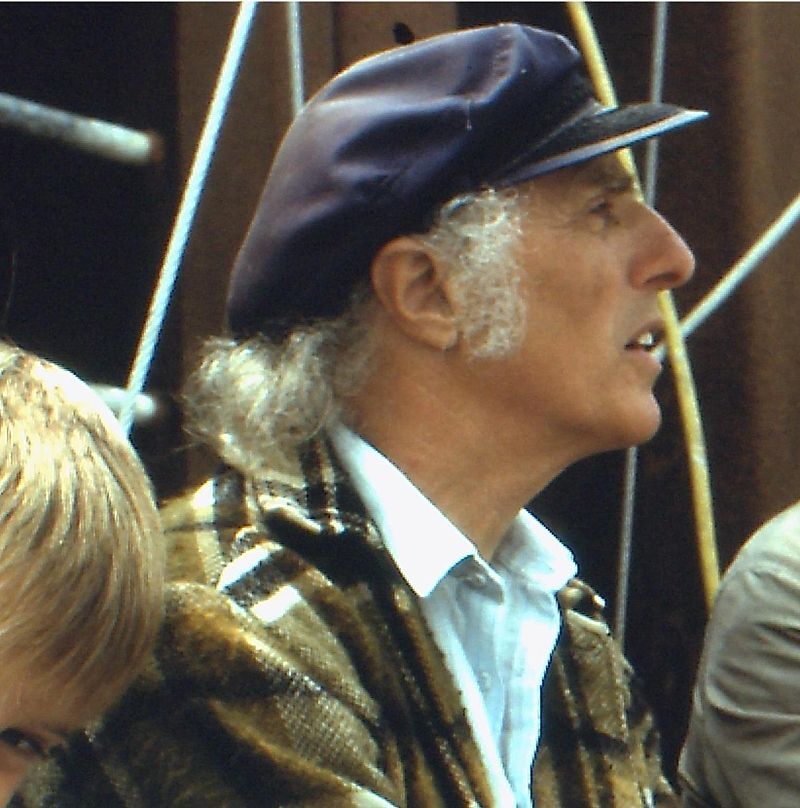Gilles Vigneault is a Quebec poet, storyteller and singer-songwriter. In his writings, Vigneault describes the people of his country and Quebec's heritage. His songs include Mon pays, Les gens de mon pays, Gens du pays and Il me reste un pays. He is also an ardent defender of the French language and the cause of sovereignty in Quebec. In fact, his song Gens du pays is considered Quebec's unofficial national anthem.
Gilles Vigneault was educated in Rimouski and Quebec City. He obtained his classical studies, a Bachelor of Arts and a Bachelor of Letters. He had several jobs before becoming a literature teacher. However, it was at the age of 33 that his singing career began.
He has received eight honorary doctorates and numerous awards. Streets, schools and libraries bear his name. As a result, he is a Quebec icon and one of the most honored artists in the French-speaking world.

Gilles Vigneault in 1989
-
1928: Gilles Vigneault is born on October 27 in Natashquan.
-
1953: He founds the poetry magazine Émourie.
-
1958: With Jacques Labrecque, he records his first "character" songs.
-
1959: He founds Les éditions de l'Arc, where he publishes Étraves, his first collection of poems.
-
1960: With several collaborators, he founds La boîte à chansons, in Quebec City. He sings for the first time in front of an audience.
-
1962: Gilles Vigneault records his first album, Jack Monoloy, which wins the Grand Prix du disque canadien CKAC.
-
1964: He composes the song Mon pays for the film La neige a fondu sur la Manicouagan. The song wins first prize at the International Song Festival in Sopot, Poland.
-
1965: He receives the Governor General's Award for his collection of poems Quand les bateaux s'en vont.
-
1966: He begins his career in France.
-
1968: He begins his international career in the French-speaking world.
-
1970: He wins the Grand Prix de l'Académie Charles-Cros for his European album Du milieu du pont.
-
1974: During the Superfrancofête on the Plains of Abraham, he presents, with Félix Leclerc and Robert Charlebois, the show J'ai vu le loup, le renard, le lion.
-
1975: He creates the song Gens du pays and sings it at the Saint-Jean-Baptiste Day show on Mont-Royal.
-
1976: Together with a number of Quebec personalities (Robert Charlebois, Yvons Deschamps, Jean-Pierre Ferland and Claude Léveillée), he presents the show Une fois cinq.
-
1977: He receives the Grand Prix de l'Académie Charles-Cros for his album Une fois cinq, and is named Chevalier de l'Ordre de la Pléiade.
-
1978: He publishes Les quatre saisons de Piquot, the first in a long series of record-books for children.
-
1982: He receives the Canada Council Molson Prize for lifetime achievement.
-
1985: He is named Knight of the National Order of Quebec and Knight of the National Order of the Legion of Honor (France)
-
1987: He receives the Prix Génie for his song Les îles de l'enfance, written for the film Équinoxe.
-
1990: He receives the Grand prix Charles-Cros for his boxed set 101 chansons, marking thirty years in the music business.
-
1993: He receives the William-Harold-Moon Award, the highest distinction given to a Canadian songwriter.
-
1998: He releases the album Au doux milieu de vous to mark 40 years of songwriting.
-
1999: He is named Commandeur des arts et lettres de la République française at the Printemps du Québec in Paris.
-
2000: The children's album Un trésor dans mon jardin is released.
-
2005: He launches the instrumental album Si on voulait danser sur ma musique, featuring 15 reels and a waltz.